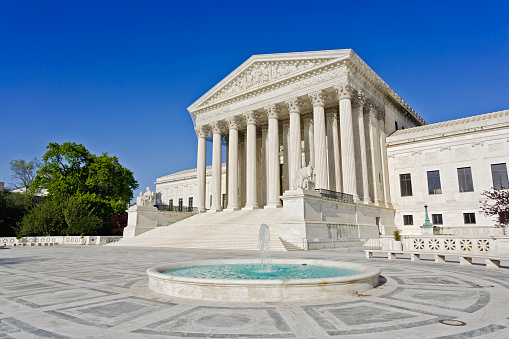It took the threat of Covid-19 to nudge the U.S. Supreme Court a short step into the 21st Century.
Breaking with longstanding tradition on Monday, the justices for the first time held a conference call to hear oral arguments in a case — and for the first time, anyone could listen in.
The high court’s grand chamber in the building that’s been called the Marble Palace sat empty of justices, lawyers, reporters and spectators.
“It’s a remarkable development and completely unexpected,” said Bruce Collins, the general counsel of C-SPAN, told the New York Times. C-SPAN was among the broadcasters offering live coverage of the arguments.
The dramatic change couldn’t have been anticipated before the arrival of the coronavirus and social-distancing efforts to mitigate its spread. Six of the nine justices are 65 or older and thus in the most at-risk group for dying of Covid-19.
After two minutes of speaking by counsel, Chief Justice John Roberts asked the first question, and was followed by the other justices in order of seniority.
In an additional rarity, Justice Clarence Thomas broke his usual silence and asked several questions; it was the first time he has spoken this term.
The case at hand was hardly earthshaking — a trademark dispute involving an online travel service. But the novelty of actually hearing the justices’ voices without being in the courtroom drew a wide audience.
Nothing in the Constitution precludes the Supreme Court of the United States (SCOTUS) from hearing cases via teleconference. After all, the telephone didn’t even exist until nearly a century after the constitution was ratified.
But from the late 19th Century on, justices refused numerous requests to permit their proceedings to be transmitted to the public by phone, radio or television. Which makes Monday, May 4, 2020, a date for the judicial history books.
Among nine other cases the justices will hear by phone over the next two weeks are three set for May 12 that are certain to draw widespread attention involving subpoenas from Congress and federal prosecutors in New York seeking President Trump’s financial records.
Release of those records “could yield a politically explosive decision this summer as the presidential campaign enters high gear,” the Times says.
Other cases coming up this month include arguments on whether a member of the Electoral College may vote for a presidental candidate different from the one they pledged to support, and whether the Trump administration may let employers limit workers’ access to free birth control.
Before Monday’s session, the court issued special instructions to the lawyers who would be arguing by phone, including an order to “be concise and responsive to each question so that each justice will have adequate time for questioning.”
For the general public listening in, Monday’s proceedings might have been difficult to follow.
“Supreme Court oral arguments bear little resemblance to courtroom dramas as seen on television. The rhetoric is legalistic, relying heavily on the court’s precedents. Those who have not studied the case beforehand often have trouble following the conversation,” says the Washington Post.



